The Fyodor Dostoyevsky Group discussion

This topic is about
The Brothers Karamazov
The Brothers Karamazov
>
Week I - 31/01/2014 - 6/02/2014 - Book I & Book II
date newest »
newest »
 newest »
newest »
 Kalliope wrote: "You will enjoy Natasha's Dance even if there is so much controversy around Orlando Figes.
Kalliope wrote: "You will enjoy Natasha's Dance even if there is so much controversy around Orlando Figes.May I suggest you go for lunch to .."
Thank you! I love food recommendations. :D
Do you know le café Pouchkine in Paris? Tucked in one side of le grand magasin Le Printemps. It's not very Russian (it's more like Ladurée and all those) but it's nice all the same. :)
http://www.cafe-pouchkine.fr/
ETA: Je pense qu'une visite à l'église orthodoxe de Paris s'impose aussi! :)
 Kalliope wrote: "I have read Troyat's. Dostoievski "
Kalliope wrote: "I have read Troyat's. Dostoievski "That is a very old book now (and worse, pre-Bakhtin).
Joseph Frank's "Dostoevsky a writer in his time" is probably as definitive as and likely to be available in English for our generation. Though for something shorter I enjoyed Geir Kjetsaa's Dostoyevsky.
Jan-Maat wrote: "
Joseph Frank's "Dostoevsky a writer in his time" is probably as definitive as and like..."
Yes, but I like Henri Troyat. He was originally Russian.
Joseph Frank's "Dostoevsky a writer in his time" is probably as definitive as and like..."
Yes, but I like Henri Troyat. He was originally Russian.
 The Orsay Museum held an exhibition on Russian Art in the second half of the nineteenth century but of course the calague (L'Art russe : Dans la seconde moitié du XIXe siècle : en quête d'identité) is out of print. Grrr. Still the musée left their little online presentation (and in English too!):
The Orsay Museum held an exhibition on Russian Art in the second half of the nineteenth century but of course the calague (L'Art russe : Dans la seconde moitié du XIXe siècle : en quête d'identité) is out of print. Grrr. Still the musée left their little online presentation (and in English too!):http://www.musee-orsay.fr/en/events/e...

Nikolaï Kusnetsov (1850-1929) Celebration Day 1879
Moscow, Tretyakov Gallery

Ivan Kramskoi (1837-1887) Christ in the Desert 1872
Moscow, Tretyakov Gallery
Dostoevsky mentions another painting by Kramskoi in book III. This Christ in the Desert suits him well too...
Book Portrait wrote: "
Do you..."
Actually, the one I was thinking of is this one, which is next door to the one above...That is why I could not recognize the name (which has changed owners nevertheless).
http://www.daru.fr
Supposedly the oldest in Paris.
Do you..."
Actually, the one I was thinking of is this one, which is next door to the one above...That is why I could not recognize the name (which has changed owners nevertheless).
http://www.daru.fr
Supposedly the oldest in Paris.
Book Portrait wrote: "The Orsay Museum held an exhibition on Russian Art in the second half of the nineteenth century but of course the calague ([book:L'Art russe : Dans la seconde moitié du XIXe siècle : en quête d'ide..."
Thank you...!!!
Thank you...!!!
 Book Portrait wrote: "We know that Dostoevsky's time in Siberia deeply changed him... I'd like to know more about the man and the dramatic changes that Russia underwent in the XIX century, and in particular the role of the Orthodox Church, to measure the full impact of what Dostoevsky is telling us, beyond the Karamazov family story... "
Book Portrait wrote: "We know that Dostoevsky's time in Siberia deeply changed him... I'd like to know more about the man and the dramatic changes that Russia underwent in the XIX century, and in particular the role of the Orthodox Church, to measure the full impact of what Dostoevsky is telling us, beyond the Karamazov family story... "Dostoevsky's Christianity was quite singular. As you say, Siberia (and in particular the mock execution he was put through, in was in the second batch of those due to be killed but even so...) were big influences - his pre-Siberian writings are quite different. Also he read the New Testament - which was unusual, he was relatively well educated at the Engineer's school (he certainly read Pascal there) and as we see in Brothers Karamazov his pan-slavism means he's more open to other Orthodox traditions (like the Starets).
But we'll see later that Dostoyevsky was also interested in Islam, I've read somewhere that there are some Buddhist themes in his writings - but I'm not sure where he would have got that from.
He's not very orthodox in his Orthodoxy :)
For background I would suggest a recent biography like Joseph Frank's as the discussion of the political and cultural milieu will be built around Dostoyevsky himself.
One big difference between Russian Orthodoxy and Anglo-Saxon Protestantism and Roman Catholicism to a lesser extent is that at that time it had no tradition of Biblical literalism. So there was no or very little religious opposition to new scientific theories like evolution, so Dostoyevsky could be both intellectually curious and deeply religious in a way that was particular to his place and time.
Though more generally particularly at parish level the Orthodox church was poor and under educated. Deeply associated with the government too.
Jan-Maat wrote: "Book Portrait wrote: "We know that Dostoevsky's time in Siberia deeply changed him... I'd like to know more about the man and the dramatic changes that Russia underwent in the XIX century, and in p..."
I added the Frank bio..
I added the Frank bio..
 Kalliope wrote: "Yes, but I like Henri Troyat. He was originally Russian."
Kalliope wrote: "Yes, but I like Henri Troyat. He was originally Russian."Oh well, since you like him then that's fine! :)
No, I enjoyed his Tolstoy biography too, but that also is old. There's nothing wrong in that but he would have been drawing on what was available to him in France, probably mainly books in print up to the 1930s. Dostoevsky studies where completely revolutionised by Bakhtin whose work didn't start appearing in the west until I guess the 60s if not later.
ETA corrected a 'we' to a 'he'. My take on Troyat is he going to be more broad brush, while the Frank is going to be more complex coming out of having being working on Dostoevsky for decades. You pay your money and take your choice ;)
Troyat's Tolstoy is very, er, colourful, I was left with the strong impression of Troyat's opinions about Tolstoy but that is not the same as being accurate or honest - although it may make for a more fun read!
 Kalliope wrote: "Thank you...!!!"
Kalliope wrote: "Thank you...!!!"Eh eh I know your weaknesses. Although I could have done better: three !!! but no upside down one. ^^
 Jan-Maat wrote: "Dostoevsky's Christianity was quite singular. As you say, Siberia (and in particular the mock execution he was put through, in was in the second batch of those due to be killed but even so...) were big influences..."
Jan-Maat wrote: "Dostoevsky's Christianity was quite singular. As you say, Siberia (and in particular the mock execution he was put through, in was in the second batch of those due to be killed but even so...) were big influences..."Spasiba JM! Your comment has further whetted my appetite! And it reinforces the impression that it's really important to have some background knowledge to understand Dostoevsky. I just got a couple of books but I'll look at Joseph Frank's bio of Dostoevsky afterwards. It's quite a tome! Bakhtin sounds interesting too (I just glimpsed his wiki page)...
A couple of months ago they showed a Russian miniseries on Dostoevsky on Arte, the Franco-German television. The opening scene was the staged execution. Unfortunately I fell asleep watching it (I don't think it was bad, I was just tired. ^^). Maybe it's on YouTube somewhere...
David wrote: "I don’t really see the narrator as unreliable and I’d be interested to know why some readers find him such. It seems to me that he is trying to provide accurate information from wherever he has fou..."
I agree David, I didn't think the narrator was unreliable but rather an omniscient one. At some point I even wondered if it might have been Dostoevsky himself, specially because of the constant shift between the playfulness and foreboding of his tone.
I agree David, I didn't think the narrator was unreliable but rather an omniscient one. At some point I even wondered if it might have been Dostoevsky himself, specially because of the constant shift between the playfulness and foreboding of his tone.
 Found the Russian miniseries. No longer available on Arte but available on YouTube. In Russian. >_<
Found the Russian miniseries. No longer available on Arte but available on YouTube. In Russian. >_<http://www.youtube.com/watch?v=LmtlX1...

http://www.arte.tv/guide/fr/048736-00...
I might still watch it. Russian sounds so nice. :)
Great posts above guys. I'm afraid I won't be able to read any bio of Dostoyevsky at present but thanks for all the suggestions.
@Dolors: Here's an interesting blog post regarding the role of narrator in TBK - http://swerveandvanish.blogspot.in/20...
@Dolors: Here's an interesting blog post regarding the role of narrator in TBK - http://swerveandvanish.blogspot.in/20...
 Book Portrait wrote: "And it reinforces the impression that it's really important to have some background knowledge to understand Dostoevsky"
Book Portrait wrote: "And it reinforces the impression that it's really important to have some background knowledge to understand Dostoevsky"Hmm. I really don't want to give the impression that you have to read a biography to understand Dostoevsky. I really do want to say that anybody can read and enjoy one of his books as it is.
But for example with regard to the mock execution there are a couple of scenes in Brothers Karamazov in which a character has a similarly intense experience and feels they have had been given a second chance
to live. Or again you might read BK slightly differently if you know that it was believed that Dostoevsky's father was murdered while the author was still a child - Freud got quite excited about that!
 Lol. Freud, never shy of a little controversy. I'll read his essay when we're done with TBK. I agree one can read Dostoevsky without knowledge of his biography or of Russia at the time, particularly as he is very readable (I'm trying to stick to the schedule and not to gulp down the whole book in a couple of days!) but there's clearly so much more underneath... I'd just like to have some of the keys. :)
Lol. Freud, never shy of a little controversy. I'll read his essay when we're done with TBK. I agree one can read Dostoevsky without knowledge of his biography or of Russia at the time, particularly as he is very readable (I'm trying to stick to the schedule and not to gulp down the whole book in a couple of days!) but there's clearly so much more underneath... I'd just like to have some of the keys. :)
 Book Portrait wrote: "I'm now looking at XIX-century Russian art... The Russian Museum seems to have a very nice collection"
Book Portrait wrote: "I'm now looking at XIX-century Russian art... The Russian Museum seems to have a very nice collection"Your post jostled memory of a small Russian Museum in Minneapolis...I checked to see what they have on exhibit...an artist who mid-century was exiled for 10 years in Siberia. I will be there before this closes...I'll be sure to check it out.
Eva Levina-Rozengolts: Reflections on a Siberian Exile
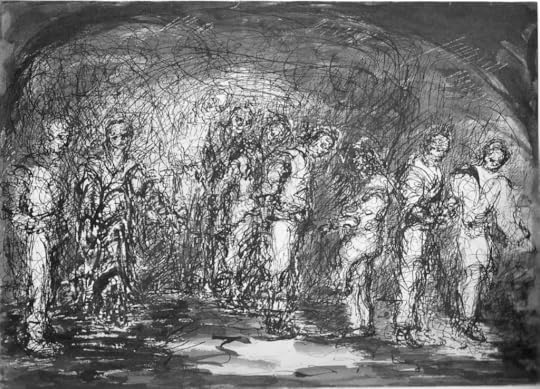
https://tmora.org/exhibition/discover...
Book Portrait wrote: "
http://www.youtube.com/watch?v=LmtlX1...
http://www.arte.tv/guide/fr/048736-00...-..."
I would love to be able to watch this, and I agree, Russian sounds so nice.. I love listening to Russian operas.
http://www.youtube.com/watch?v=LmtlX1...
http://www.arte.tv/guide/fr/048736-00...-..."
I would love to be able to watch this, and I agree, Russian sounds so nice.. I love listening to Russian operas.
 Ce Ce wrote: "Your post jostled memory of a small Russian Museum in Minneapolis...I c..."
Ce Ce wrote: "Your post jostled memory of a small Russian Museum in Minneapolis...I c..."Oooh this is very good. They even have online exhibitions. They have one on Icons:
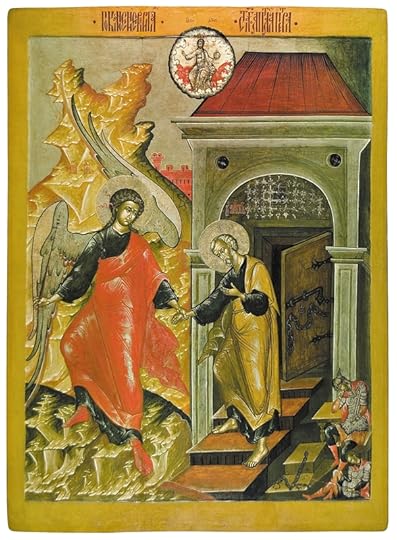
The Deliverance of Apostle Peter from Prison
http://tmora.org/online_exhibits/exhi...
and one on Textiles of Old Russia with beautiful historical photographs:
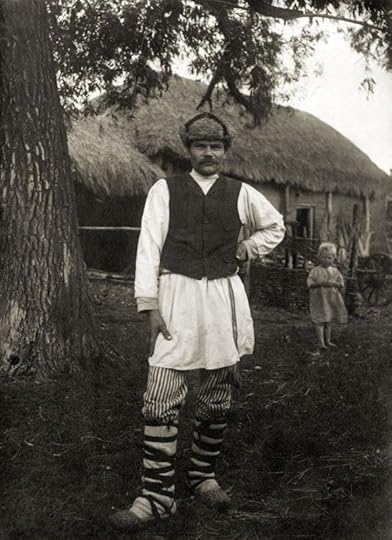
Man in peasant dress
http://tmora.org/online_exhibits/exhi...
and they have others, on architecture and the silk road and and ... Quite impressive for a small museum! I hope you get to see their collection when you go to Minneapolis. :)
 Book Portrait wrote: "Ce Ce wrote: "Your post jostled memory of a small Russian Museum in Minneapolis...I c..."
Book Portrait wrote: "Ce Ce wrote: "Your post jostled memory of a small Russian Museum in Minneapolis...I c..."Oooh this is very good. They even have online exhibitions. They have one on Icons:"
Thank you for checking more deeply...I am looking! Fascinating. I will definitely visit when I am there...probably about the time we finish TBK.
 The Tretyakov Gallery in Moscow also has a very good web site for those interested in Russian art:
The Tretyakov Gallery in Moscow also has a very good web site for those interested in Russian art:http://www.tretyakovgallery.ru/en/

Perov, Vasily Grigorievich - Portrait of Fedor Dostoyevsky 1872
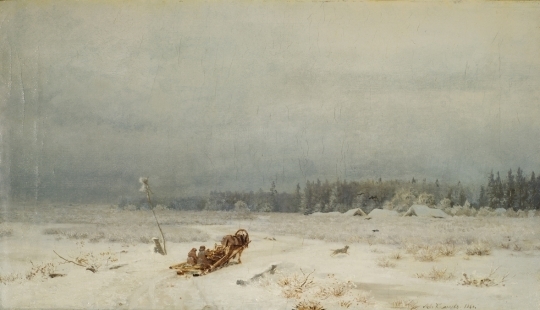
Kamenev Lev Lvovich - Winter Road 1866
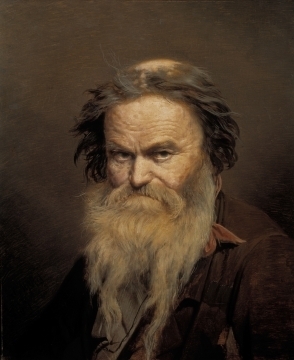
Perov, Vasily Grigorievich - Fomushka the Owl 1868
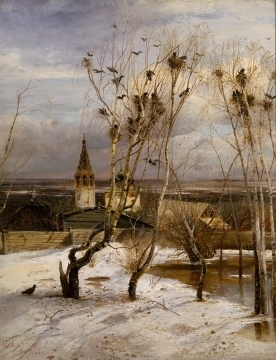
Savrasov, Aleksey Kondratievich - Rooks have Returned 1871
 Wow, great start of discussion. I was afraid I was missing the boat on this one, but I managed to read today the first 2 books, so I guess I'm still on track.
Wow, great start of discussion. I was afraid I was missing the boat on this one, but I managed to read today the first 2 books, so I guess I'm still on track.I love all the interesting links, especially the ones about the inspiration for Elder Zosima, although I believe not all are directly related with this week's topic. Maybe it will be better to move some to a separate thread about art galleries and photos, where they will be easier to find later.
Regarding my impressions I got several ideas I'd like to develop further:
1 - I forgot all but the general outline since I first read the book 20 years ago, and I was pleasantly surprised by the humour in the opening chapters. I think the P-V translation is much better than the Romanian one I read then. I'll be on the lookout for this satire element in later books
2 - right from the start there is a short anecdote about a silly woman who commited suicide out of misguided ideas about love. Could this book be considered an anti-romanticism manifesto? A search for a truer form of expression of emotion without cheap sentimentality? and without the dry naturalism of Zola.
3 - I've bookmarked most of the debate about eclesiastical courts, because I really want to go back to it and ruminate further on the separation between church and state. Great stuff.
4 - picked up a quote that may be the key of my future review : The whole question of you Karamazovs comes down to this: you're sensualists, money-grubbers, and holy fools!
cheers!
 Done with Book I. Wow. The story setup is astounding. I can't wait to see what happens next.
Done with Book I. Wow. The story setup is astounding. I can't wait to see what happens next. Love the intermingling of not just religion, but spiritually. I assume these themes will be explored in-depth later...
Is it too soon to have fallen for Alyosha already? Think I have.
Algernon wrote: "picked up a quote that may be the key of my future review : The whole question of you Karamazovs comes down to this: you're sensualists, money-grubbers, and holy fools!"
I loved that quote too along with A brazen face and a Karamazov conscience. It's great to notice how the Karamazov family is not glorified in any way (I was expecting them to be full of virtues and all) but Dostoyevsky surprised me with the character sketch of brothers and their father. They all are far from perfect and that adds up to all the excitement of reading about them.
I loved that quote too along with A brazen face and a Karamazov conscience. It's great to notice how the Karamazov family is not glorified in any way (I was expecting them to be full of virtues and all) but Dostoyevsky surprised me with the character sketch of brothers and their father. They all are far from perfect and that adds up to all the excitement of reading about them.
Cheryl wrote: "Done with Book I. Wow. The story setup is astounding. I can't wait to see what happens next.
Love the intermingling of not just religion, but spiritually. I assume these themes will be explored i..."
It's early, yes but Love is an impulsive emotion so no worries ;)
Love the intermingling of not just religion, but spiritually. I assume these themes will be explored i..."
It's early, yes but Love is an impulsive emotion so no worries ;)
 Garima wrote: "Tej wrote: "Going through the excellent posts above, the pictures of monasteries and Elders, I was reminded very fondly of the works of the great Andrei Tarkovsky and all the Rusophiles or otherwis..."
Garima wrote: "Tej wrote: "Going through the excellent posts above, the pictures of monasteries and Elders, I was reminded very fondly of the works of the great Andrei Tarkovsky and all the Rusophiles or otherwis..."A resounding echo of a Sigh !!! ha!
Great, Absolutely Ecstatic to know that, Garima :)
but if you do catch up with Rublev, do not at all, by any means stop at that and go on to Stalker' and 'Mirror' as well ... Don't have words to describe the spell binding unprecedented nature of effect they had...! Mesmerizing :))
 Dolors wrote: "What a fitting quotation to describe Fyodor and his excesses and flaws, Tej. I was very taken with the adjectives Dostoevsky used to describe him in chapter four of Book I: He was wicked and sentim..."
Dolors wrote: "What a fitting quotation to describe Fyodor and his excesses and flaws, Tej. I was very taken with the adjectives Dostoevsky used to describe him in chapter four of Book I: He was wicked and sentim..."Spot on, spot on, you are, as always :)
And Dolors, the veneer of civility that he pretends so humorously at times and then once the buffonery is revealed he lets them have it all, ha ha!
All semblance of gentility goes to the wind and what remains is his incessant triviality in all things...
That is so very insightful, Dolors, guilt in its various hues... besote them all... even the elder! The 'Karamazov' sensuality and the accompanying inadvertent and advertent guilt...! Thank you for this most perceptive comment :)
 Book Portrait wrote: "Tej wrote: "Okay, so I have a lot of lag to cover-up, but I must thank once again Garima-Samadrita for this initiative, as TBK always makes me shake of the scum of life that clouds my eyes like few..."
Book Portrait wrote: "Tej wrote: "Okay, so I have a lot of lag to cover-up, but I must thank once again Garima-Samadrita for this initiative, as TBK always makes me shake of the scum of life that clouds my eyes like few..."You are most welcome, BP and do move over to 'Stalker' and 'Mirror' as well... an altogether novel revelation of the wonders that a camera can portray, ofcourse if one feels that connection with Tarko :)
Here's another passage dedicated to Fyodor, then :)
'That is exactly how it all seems to me, when I walk into a room, that I’m lower than anyone else, and that everyone takes me for a buffoon, so ‘Why not, indeed, play the buffoon, I’m not afraid of your opinions, because you’re all, to a man, lower than me!’ That’s why I’m a buffoon, I’m a buffoon out of shame, great elder, out of shame. I act up just because I’m insecure. If only I were sure, when I came in, that everyone would take me at once for the most pleasant and intelligent of men—oh, Lord! what a good man I’d be! Teacher!” he suddenly threw himself on his knees, “what should I do to inherit eternal life?” It was hard even now to tell whether he was joking or was indeed greatly moved.'
 Of the brothers it seems to me that Dmitri is most like the old man. They both act primarily on impulse. They will often act on an impulse and then on a contradictory impulse that immediately follows. They are both driven mainly by passions. Dmitri, unlike Fyodor, has a moral center. He at least feels shame and guilt over his actions. Grushenka is also driven by impulse. Fyodor, Dmitri, and Grushenka are all unpredictable. They frequently become the center of the action because the other characters have to deal with their unpredictability. They create pandemonium which the others then have to deal with.
Of the brothers it seems to me that Dmitri is most like the old man. They both act primarily on impulse. They will often act on an impulse and then on a contradictory impulse that immediately follows. They are both driven mainly by passions. Dmitri, unlike Fyodor, has a moral center. He at least feels shame and guilt over his actions. Grushenka is also driven by impulse. Fyodor, Dmitri, and Grushenka are all unpredictable. They frequently become the center of the action because the other characters have to deal with their unpredictability. They create pandemonium which the others then have to deal with.
 David wrote: "Of the brothers it seems to me that Dmitri is most like the old man. They both act primarily on impulse. They will often act on an impulse and then on a contradictory impulse that immediately follo..."
David wrote: "Of the brothers it seems to me that Dmitri is most like the old man. They both act primarily on impulse. They will often act on an impulse and then on a contradictory impulse that immediately follo..."I like your analysis of that triangle where passions run high.
The character I'd worry about is Ivan: extremely smart and cynical. I'm waiting to see what he's up to! Alexei feels so innocent... I wonder if he'll become a Christus dolens (suffering christ) figure in this story before Dostoevsky allows him to achieve a full spirituality... {I've been reading a biography of Dostoevsky where his views on Art are discussed, in particular in reaction to Nikolay Chernyshevsky's thesis...}
ETA: juste pour le plaisir (aka because I can't be helped!):
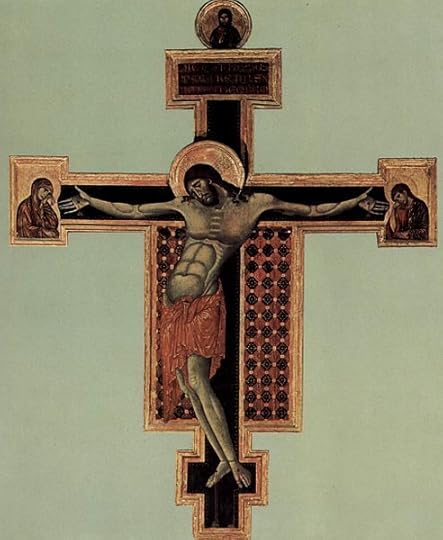
Christus dolens, Cimabue
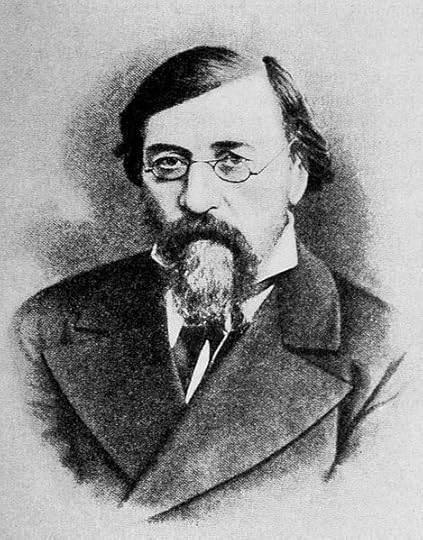
Nikolay Chernyshevsky
 David wrote: "..."
David wrote: "..."David, did you think more about the narration? I'd be interested to know how you'd define "unreliable narrator"... :)
 The Brothers Karamazov is my favorite novel and I have read it a number of times now. It is a novel of such depth, resonance, and complexity that I find it to be perhaps even more interesting with each reading. For those who are reading it for the first time I would suggest that they pay close attention to the events in this early part of the novel—especially those relating to Dmitri. They will play an important part in what happens later.
The Brothers Karamazov is my favorite novel and I have read it a number of times now. It is a novel of such depth, resonance, and complexity that I find it to be perhaps even more interesting with each reading. For those who are reading it for the first time I would suggest that they pay close attention to the events in this early part of the novel—especially those relating to Dmitri. They will play an important part in what happens later.
 David wrote: "Of the brothers it seems to me that Dmitri is most like the old man. They both act primarily on impulse. They will often act on an impulse and then on a contradictory impulse that immediately follo..."
David wrote: "Of the brothers it seems to me that Dmitri is most like the old man. They both act primarily on impulse. They will often act on an impulse and then on a contradictory impulse that immediately follo..."BP
I’m fascinated to read that you are thinking of Ivan in this way. Having read the book a number of times I know what lies ahead. I’m sure you will find it interesting to see how his role in the events plays out.
As for your question about the narrator:
I think of an unreliable narrator as one who you can’t trust—because he is deliberately deceitful, or tends to recount events with too much imagination, or has an insecure grasp of reality, etc. You have to take his unreliability into account in understanding the novel. It’s decades since I read Thomas Mann’s Confessions of Felix Krull, but as I remember, Krull was such an unreliable narrator. Maybe I’m being too narrow in my conception. I guess the next thing to do is google the term to find out what it’s generally thought to mean.
 Garima wrote: "Algernon wrote: "picked up a quote that may be the key of my future review : The whole question of you Karamazovs comes down to this: you're sensualists, money-grubbers, and holy fools!"
Garima wrote: "Algernon wrote: "picked up a quote that may be the key of my future review : The whole question of you Karamazovs comes down to this: you're sensualists, money-grubbers, and holy fools!"I loved t..."
This is certainly an interesting and striking statement about the Karamazovs. However, I have to say that I really don’t know what to make of it. I don’t have a certain memory of who said it. I think it was Rakitin talking to Alyosha. As a statement applying to all the Karamazovs it seems to me to be way off the mark. There’s no indication that Alyosha is a sensualist and money-grubber. Ivan seems not to be either. Ivan is not a holy fool. I don’t have the impression that Fyodor and Dmitri are holy fools. Alyosha is religious, but I can’t see that he is anywhere portrayed as a fool. Maybe the statement is just meant to indicate an anti-Karamazov prejudice in the way the town thinks of the Karamazovs.
David wrote: "Garima wrote: "Algernon wrote: "picked up a quote that may be the key of my future review : The whole question of you Karamazovs comes down to this: you're sensualists, money-grubbers, and holy foo..."
It was a thought by Miusov about Fyodor when they were about to attend Dinner at Monastery amidst all the kerfuffle.
the statement is just meant to indicate an anti-Karamazov prejudice in the way the town thinks of the Karamazovs.
That's about it.
It was a thought by Miusov about Fyodor when they were about to attend Dinner at Monastery amidst all the kerfuffle.
the statement is just meant to indicate an anti-Karamazov prejudice in the way the town thinks of the Karamazovs.
That's about it.
 David wrote: "There’s no indication that Alyosha is a sensualist and money-grubber. Ivan seems not to be either. Ivan is not a holy fool. I don’t have the impression that Fyodor and Dmitri are holy fools. Alyosha is religious, but I can’t see that he is anywhere portrayed as a fool. "
David wrote: "There’s no indication that Alyosha is a sensualist and money-grubber. Ivan seems not to be either. Ivan is not a holy fool. I don’t have the impression that Fyodor and Dmitri are holy fools. Alyosha is religious, but I can’t see that he is anywhere portrayed as a fool. "Holy fool has a specific meaning, they were a particular category of saints and holy men iirc St Andrew was the prototype:
http://orthodoxwiki.org/Andrew_the_Fo...
Not that I would rule out anti-Karamazov prejudice, but that kind of spirituality can be seen as a negative from a worldly point of view.
 Jan-Maat wrote: "David wrote: "There’s no indication that Alyosha is a sensualist and money-grubber. Ivan seems not to be either. Ivan is not a holy fool. I don’t have the impression that Fyodor and Dmitri are holy..."
Jan-Maat wrote: "David wrote: "There’s no indication that Alyosha is a sensualist and money-grubber. Ivan seems not to be either. Ivan is not a holy fool. I don’t have the impression that Fyodor and Dmitri are holy..."Thanks for the illuminating information. Came across a recurrence yesterday. In the chapter “Strain in the Drawing Room” Katerina Ivanovna, in a moment of anger, calls Alyosha a “little holy fool.” I began to wonder if the term for which “holy fool” is a translation is a common expression in Russia and if it has connotations which don’t come across in the English translation. Your post clears that up. But I still can’t see Ivan, or Dmitri, or Fyodor as holy fools, or Alyosha as a sensualist and money-grubber.
 Ivan as a holy fool may appear later in the book. I can' t say yet where , but i recommend patience. None of the brothers is easy to pin down into one clear cut category. That's a big portion of their appeal : unpredictable, passionate reactions. There's a passage that I will try to recover where one of them says it's better to burn brightly and fast rather than putter along timidly
Ivan as a holy fool may appear later in the book. I can' t say yet where , but i recommend patience. None of the brothers is easy to pin down into one clear cut category. That's a big portion of their appeal : unpredictable, passionate reactions. There's a passage that I will try to recover where one of them says it's better to burn brightly and fast rather than putter along timidly
 I am coming very late to the party here, but just wanted to thank all for their valuable comments.
I am coming very late to the party here, but just wanted to thank all for their valuable comments.I just finished the first two books. The chapter 5 of book 2, was something that I had to read twice to get a better grasp of things discussed. Something, that stayed with me is the Elders mention of a Russian criminal being different from criminal from elsewhere, because of his lasting faith. Is there any basis for such an idea or is it a suggestion /assumption by the Elder?
Books mentioned in this topic
L'Art russe dans la seconde moitié du XIXe siècle : en quête d'identité (other topics)Russia: A History (other topics)
Natasha's Dance: A Cultural History of Russia (other topics)
Dostoïevski (other topics)
Dostoïevski (other topics)
More...






Thanks! Natasha's Dance ..."
You will enjoy Natasha's Dance even if there is so much controversy around Orlando Figes.
May I suggest you go for lunch to ..
http://www.alavilledepetrograd.com/in...
Even though it has changed owner... and it looks more pricey and fashionable than it used to be !!!... It is in front of the Orthodox Cathédrale St Alexandre-Nevski. Rue Daru).
That is just across from the Orthodox